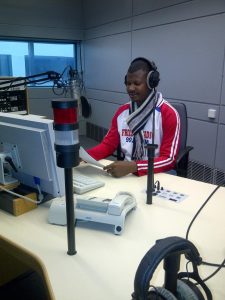When Savannah Radio, Kano, went on air in 2002 (before becoming Freedom Radio Nigeria in December 2003), it became an instant magnet that attracted thousands of followers – and this long before the advent of social media as a commodity. For me the main attraction was the MD, Faruk Ɗalhatu. He is an incredibly nice, innovative and kind person with whom we had several interfaces when he established Midtown Business Centre in Kano. During his tenure at MBC, he provided innovative services that no other business centre offered at the time in Kano. MBC was virtually the first in everything connected to business computing.
It was not surprising, therefore, that Freedom Radio became a role model of innovative broadcasting when he took over as the MD almost immediately the station became fully operational. I have featured numerously as a guest on Freedom Radio through all its regime changes and the production system has maintained the superlative qualities Faruk established before he left in 2014 for Dandal Kura Radio in Maiduguri. The innovative freedom given to artists was what made the station stand out among its struggling peers at the time, both local and national, even now some 22 years after its establishment.
Consequently, for me, another attraction was the Kano Music Express music programme which Faruk curated. Having studied at Ohio University, US, has the effect of making you amenable to innovations in music! It was a radio show focusing on Rap, a favorite genre of mine.
The programme gave young aspiring MCs opportunities to showcase their verbal skills – producing some of the most innovative songs in Hausa Rap music. Through the programme, I was able to curate about 100 standout Hausa Rap songs that would shake any crowd in New York City, despite being in Hausa language.
Then the political programmes and the creation of sojojin baka — vocal warriors — guys who were sponsored to have a few seconds slot to protect, project or lambast a particular politician in Kano and Jigawa states. Not to everyone’s taste, but the creative controllers at Freedom Radio believe in fair hearing and balancing out opinions. And not being owned or sponsored by the government meant they had the leeway to provide services that people want. Sometimes, however, this freedom often causes issues for Freedom Radio.
Then the voices. Two of them in particular. Abubakar General and Ibrahim Ishaq Rano, more commonly referred to as Ɗan’uwa Rano. They were the ones that attracted me to the political programmes. I spent the whole of my life listening to music. Some vocalists were amazing, others were terrible, in their case, I only hang on to the band because of the music. Abubakar General’s deep baritone voice could stand out in any Italian opera. Deep, rich, textured, and without being nasal, it made his news and presentations a pleasure to listen.
Now, to Ibrahim Ishaq Ɗan’uwa Rano. Also, incredibly amazing voice. One social media outlet described it as ‘iconic’. I could not agree more.
When Abubakar General left Freedom in 2015, the vocal attracting power of the station fell on the larynx of Ishaq. His main programme was “Kowanne Gauta”, a political programme aired between 9.00 to 9.30 p.m. weekdays.
His fantastic voice was complimented by his rapid fire smooth flow – like a fast-flowing river in a shallow bed. Usually, people listen to the radio while engaged in something – the radio being in the background. Not when Ishaq is presenting. You have only a Hobson’s Choice – listen to him and stop whatever you were doing. Not possible to mix the two because you don’t want to miss a word of what he was saying. He is truly gifted.

I was so taken by the power of his powerful delivery that I sought out his number just to appreciate him. I was therefore pleasantly surprised when one day he just popped into my office and introduced himself.
Not only did he have a powerful voice, he is also a commanding and charismatic person. He has the voice and personality to attract crowds. That meeting was the start of a long-sustaining relationship between us, with him looking up to me as a mentor – a position I gladly accepted.
I was shocked therefore when he resigned from Freedom Radio on June 11, 2024. I am not aware of the intricate internal politics of the station, but I felt sad at his resignation because, for me, he remained one of the most significant reasons for listening to Freedom Radio.
When his segment clashed with an activity that prevented me from listening to him live, I would record it for listening offline (I even have a phone purposely for that).
I can only wish him the best for the future. The jingle theme of his programme, “Gautan faɗa da hujja ba gautan faɗa da makami ba” perfectly describes his resignation.
Out of sight, however, is not out of mind. I am glad that he has a YouTube channel (Ɗan’uwa Rano TV) since 2020. Like Yakubu Musa Fagge, it gives him greater freedom to be his creative self.
The late great Hausa griot, Alhaji (Dr.) Mamman Shata, sang: “Gaya wa mutane na, kowa ya rasa Shata ya yi asarar waƙa”. I will reverse the sentence, “Kowa ya samu Ibrahim Ishaq Ɗan’uwa Rano, ya yi nasarar murya.”
I foresee better prospects for him in the future. Allah Ya yi masa jagora.
* Abdalla Uba Adamu is a double Professor of Science Education and Media Studies at Bayero University, Kano. Email: auadamu@yahoo.com

